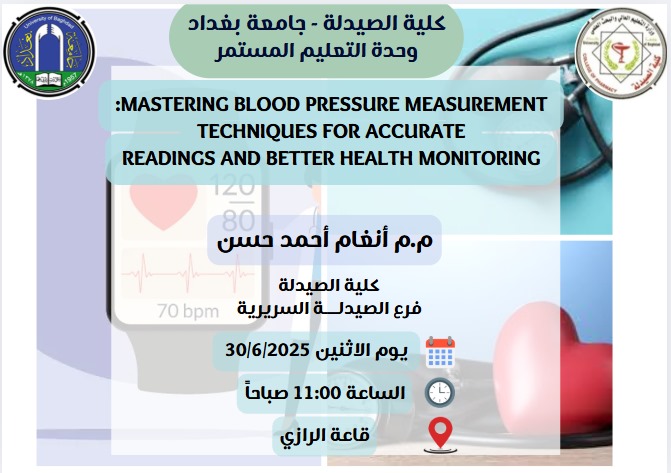Under the supervision of the Dean of the College of Pharmacy, Professor Dr. Sarmed H. Kathem Alkhateeb, the Continuing Education Unit at the University of Baghdad/College of Pharmacy held an in-person workshop entitled “Mastering Blood Pressure Measurement”, delivered by Assistant Lecturer Angham Ahmed Hasan, a faculty member at the Clinical Pharmacy Department.
The workshop aimed to enable participants to understand the importance of accurate blood pressure measurement, learn the correct techniques for measuring it, avoid common mistakes that can lead to inaccurate readings, enhance monitoring and follow-up skills in clinical and home settings, and raise health awareness among medical professionals and the general public about the significance of proper blood pressure tracking.
The workshop included several topics, including an introduction to blood pressure and a definition of its normal and abnormal values. Also, the workshop emphasized the importance of accurately measuring blood pressure to avoid misdiagnosis and highlighted the role of home monitoring in improving health outcomes. In addition, the manual and digital devices used in measuring blood pressure were reviewed, along with an explanation of the correct steps for measurement, including proper positioning of the patient, timing of the measurement, and how to use the device. Moreover, the common measurement errors and how to avoid them were highlighted, along with an explanation of how to interpret blood pressure measurement results according to international guidelines and identify cases requiring medical intervention. Furthermore, the workshop included practical training on measuring blood pressure using various devices to improve skills and address errors during real-world application.
The workshop concluded that accurate blood pressure measurement is essential for the early detection and diagnosis of hypertension and related cardiovascular conditions. Also, proper technique and correct use of devices significantly reduce measurement errors and improve patient outcomes.






